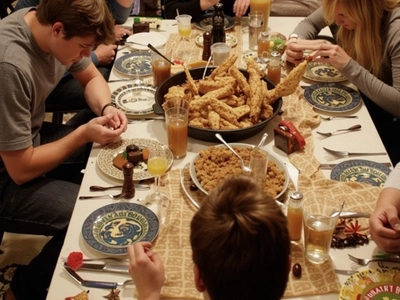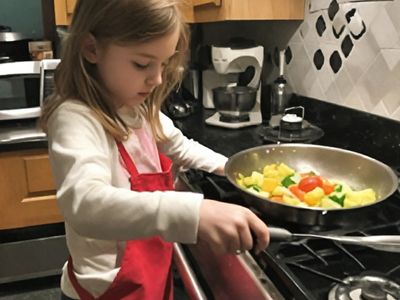My Relatives Started Complaining about My Wife's Meals at Our Monthly Family Dinners – So We Decided to Secretly Test Them
When I look back on it now, it’s almost strange to think how something as simple as a family dinner could unravel so much truth. For years, I thought these monthly gatherings were the glue that held us all together. I grew up believing they represented love, unity, and family pride. But as I later found out, sometimes traditions can be hollow if the people upholding them are not guided by love.
It all started long before my time. My grandmother had this idea to bring her siblings together every month for a meal. Back then, life was simpler, and eating together was more than just filling your stomach. It was about laughing, sharing stories, and reminding each other that family was the one constant you could rely on. My dad and his siblings kept that tradition alive, and by the time I was old enough to notice, those dinners were already a highlight in our home.
As a child, I loved them. The house would buzz with excitement all day. Mom would be in the kitchen making at least three dishes, Dad would fuss with the decorations—he always wanted everything to look special—and my siblings and I would count the hours until our cousins arrived. There was always noise, laughter, and the kind of energy only a big family could bring.
I remember one dinner in particular. Dad had decided to order pizza for all the kids. It might have been the first time we didn’t have a carefully prepared homemade dish, but to us, it felt like the best night ever. We ate until we were full, traded the last slices, and then ran off to play. To me, those moments were pure magic.
Fast forward to adulthood, and my siblings and I carried on the tradition. We rotated houses each month, and everyone got their turn to host. There were five of us: Angela, the eldest; Dan, right after her; then me; and my younger siblings, David and Gloria. Add spouses, kids, and our beloved Aunt Martha, and our gatherings usually had around thirteen or fourteen people. It was lively, sometimes chaotic, but always meaningful—or so I thought.
When I married Megan, she was thrilled to be included. Even before we tied the knot, she had seen what these dinners meant to me, and she wanted to be part of it. At first, I did most of the cooking whenever it was our turn, but Megan soon insisted on taking over.
“You know I find cooking therapeutic,” she told me one day, smiling as she tied on her apron. “Don’t worry, I’ll handle it.”
That was just Megan—kind, thoughtful, and eager to contribute. I was proud of her. She didn’t just want to be my wife; she wanted to be part of my family’s life, to give them the same warmth she gave me.
But I didn’t realize then that her kindness would be met with cruelty.
The first time she cooked for one of our dinners, the criticism came fast and sharp.
“I knew it!” Angela said, pushing her plate slightly away. “I was wondering why the food tasted off today. It’s just… bland.”
“I agree,” Dan added. “Why’s the chicken so dry?”
Mom chimed in too, offering her own unsolicited advice. “Maybe use less seasoning next time. It’s not very balanced.”
I will never forget Megan’s face in that moment. The way her eyes dropped, the way her shoulders sank—it was like all the joy she had poured into the meal had been snatched away in an instant.
I tried to defend her. “I think the chicken is perfect,” I said brightly, turning to David. “What do you think?”
David, bless him, nodded enthusiastically. “Yeah, it’s really nice. Perfect!”
But Aunt Martha added another little jab: “Shouldn’t you cook what everyone likes? That way, no one will complain next time.”
Megan’s voice trembled when she promised she’d make something different next time. I could tell she was fighting back tears, and later that night, she couldn’t hold them in anymore. I found her crying quietly in our bedroom.
“They hated it,” she whispered. “Everyone hated it except David. I don’t want to cook for them again.”
I held her, assuring her she’d done nothing wrong. In fact, I thought her food was delicious. But I convinced her to try again, hoping the next dinner would go differently. Looking back, I regret pushing her.
For the next dinner, she really outdid herself. She made roasted chicken the way Mom liked it, and red sauce pasta—Angela’s favorite. She followed recipes, watched videos, practiced the dishes, and poured herself into every detail. I tasted everything before dinner and thought it was incredible. Surely, I believed, this would win them over.
But when we all sat down, it was like déjà vu.
“I don’t think you should ever make this pasta again,” Angela said, wrinkling her nose.
Mom discreetly spat a piece of chicken into her napkin. “This isn’t roasted chicken. I’ll send you my recipe tonight.”
That was it for Megan. She didn’t even argue—just walked to the kitchen in silence. I followed, my heart breaking at the sight of her holding back tears.
“Your sister said the pasta was awful,” she whispered. “I made it just for her, and she still hated it. What am I supposed to do?”
Then I overheard my parents from the dining room.
“She’s not even trying,” Mom muttered.
“Didn’t she learn from last time?” Dad added.
I couldn’t take it anymore. I stormed out and confronted them.
“Can’t you just be nice for once?” I snapped. “Do you realize how hard she works to cook for you? You act like she’s serving poison when all she wants is to make you happy!”
Angela raised an eyebrow. “Then why can’t she get anything right?”
“If she cooked better, we wouldn’t complain,” Mom added.
It was pointless arguing. They weren’t interested in being fair. Back in the kitchen, Megan asked me something that made my stomach twist.
“They never complained when you cooked. Are they doing this on purpose?”
The thought had already crossed my mind. But hearing her say it made me determined to find out.
So I suggested a test. Next time, we’d tell everyone I was cooking, but Megan would actually prepare everything. At first, she resisted—she didn’t want to set herself up for more humiliation. But eventually, she agreed. We both needed answers.
When the day came, Megan made the same dishes again: roasted chicken and red sauce pasta. Before everyone dug in, I announced proudly, “I cooked everything today. I used your recipe for the chicken, Mom. Hope you’ll like it.”
The transformation was instant.
“This is the best pasta I’ve ever tasted!” Angela exclaimed. “I love it, Brandon!”
Mom nodded approvingly. “Perfect roasted chicken. Just the way I make it.”
Dad beamed. “Glad you took over again, son.”
Even Dan joined in: “Wow, I never knew my brother could cook this well!”
I exchanged a glance with Megan. The food they were praising so highly was the exact same food they had torn apart before. David and Gloria, who knew about the test, were trying to hide their laughter.
When everyone had finished eating, I leaned forward and said, “Just to confirm, you all loved the food, right?”
They nodded, satisfied.
“Well, here’s the truth. I didn’t cook a single thing tonight. Megan made all of it. Same dishes as before. So tell me—why is it suddenly perfect now?”
The silence that followed was heavy. Mom flushed red. Angela stared at her drink. Dad fumbled for words, finally muttering, “Maybe she’s just gotten better at cooking.”
But the damage was already done. The truth was clear. Their criticism had never been about the food. It was about Megan.
That night, I told her we were done with these dinners. “I don’t care about tradition anymore,” I said. “If all they want is to humiliate you, we’re not going back.”
She hesitated, reminding me these dinners were part of my family’s history. But I didn’t care. No tradition was worth watching her suffer.
We stopped attending. After a couple of months, the questions started. Calls, messages, complaints. Mom even yelled at me over the phone. “You’re ruining your relationship with us because of her!”
I hung up. There was nothing more to say.
Later, Gloria confirmed what I had already guessed. “Mom and Angela never really liked Megan,” she admitted. “They pretended for your sake, but they always thought she wasn’t ‘family enough.’”
Hearing that was painful, but it also brought clarity. They were never judging Megan’s cooking—they were judging her. And in their eyes, nothing she did would ever be enough.
So I chose Megan. Without hesitation. She was my family now, the one who filled my life with love and kindness. And if the old family traditions couldn’t make space for her, then they weren’t worth preserving.
Instead, we decided to build our own traditions—ones where respect and warmth mattered more than appearances, where every meal felt like home simply because we shared it together.
And that, to me, is what family is supposed to mean.






